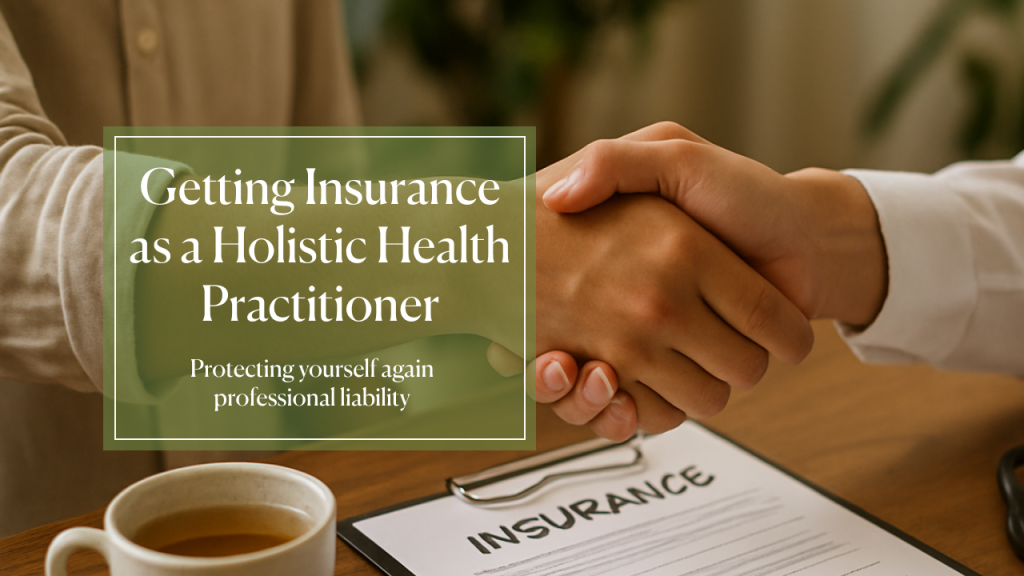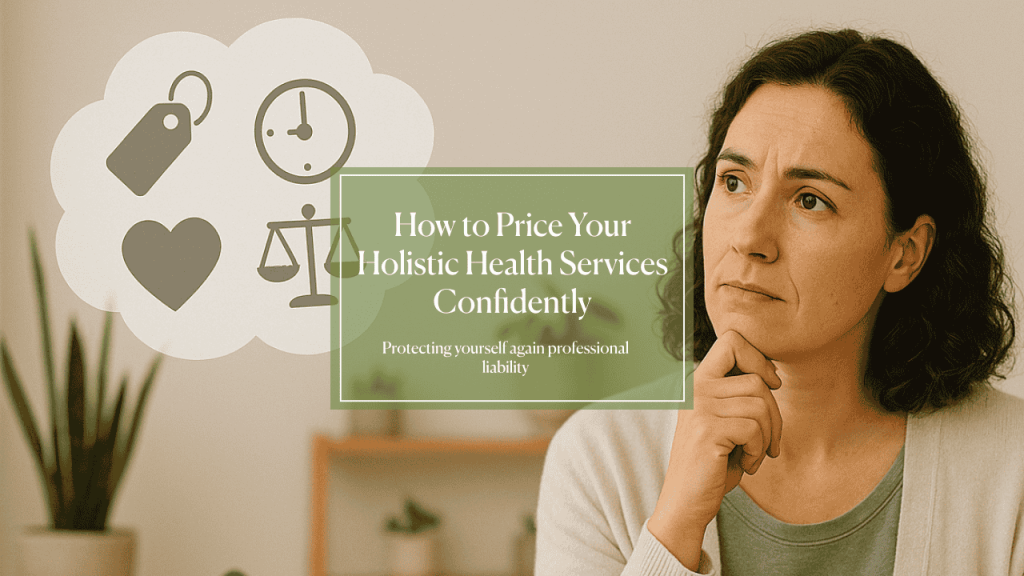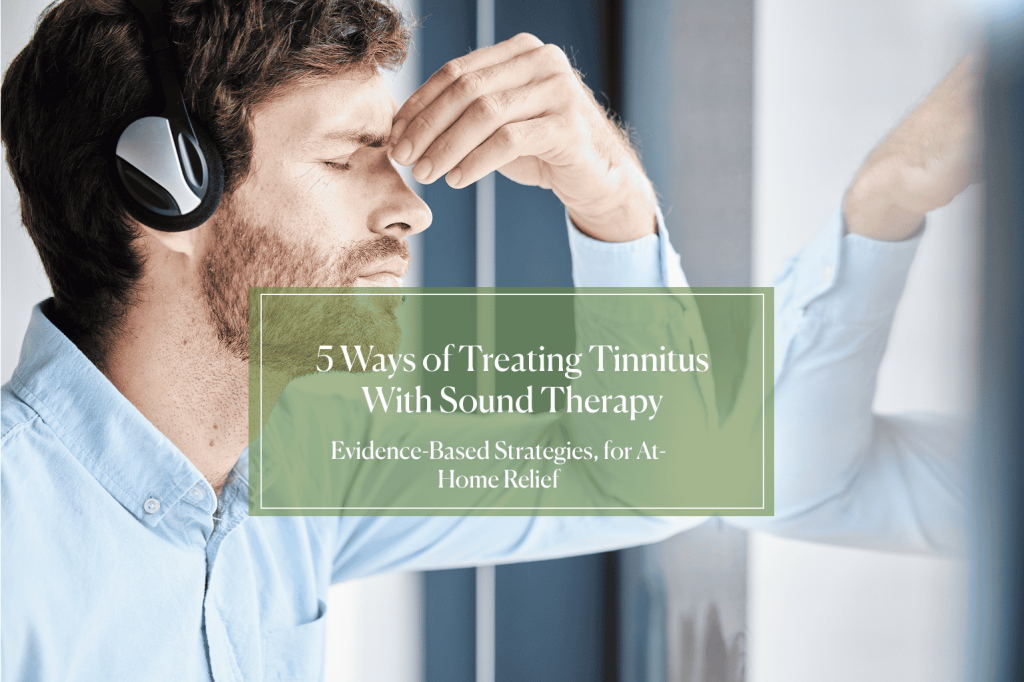How to Get Holistic Health Practitioner Insurance: Get Covered, Stay Legal & Build Trust

Table Of Contents
- Getting Insured in a Grey Zone
- What Is Professional Liability Insurance?
- Is Insurance Legally Required For Your Holistic Health Practice?
- Why Professional Liability Insurance is Worth Having—Even in Non-Clinical Roles
- Other Types of Insurance to Consider
- The Role of Scope of Practice in Insurance Eligibility
- Choosing the Right Title To Insure Your Holistic Health Practice
- Qualifying for Insurance as a Holistic Health Practitioner
- Where to Get Insured: Reputable Providers for Holistic Practitioners
- Get a Certification That Unlocks Insurance, Globally
Getting Insured in a Grey Zone: What Every Alternative and Holistic Health Practitioner Needs to Know About Holistic Health Practitioner Insurance
If you’re working in—or entering—the world of holistic health, you’ve probably asked a version of this question:
Can I get insured for what I do?
Whether you’re offering support through nutrition, energy work, sound healing, or another alternative modality, the path to professional liability insurance isn’t always obvious.
Unlike licensed medical roles, holistic and complementary practitioners often work without a standardized title, protected designation, or national registry. That makes the terrain confusing—especially when legal systems, insurers, and clients all want clarity.
The good news is: insurance is possible. In fact, many holistic professionals—certified or not—successfully obtain coverage every year. But doing so depends on more than what you do. It depends on what you call it, how you describe your scope of practice, and whether your positioning aligns with the legal landscape in your region.
This article was written to bring clarity to that process. We’ll explore how insurance works, what insurers actually care about, which titles carry legal risks, and how you can safely and ethically define your role—so that you can protect yourself, your clients, and your future.
What Is Professional Liability Insurance?

At its core, professional liability insurance (often called errors and omissions insurance, or E&O) protects you from legal claims that may arise in the course of working with clients—especially those related to perceived harm, negligence, or failure to deliver expected outcomes.
In other words, if a client believes your advice, guidance, or service caused them harm—financial, physical, or emotional—they may seek compensation. Even if the claim is unfounded, defending yourself can be costly. Professional liability insurance exists to cover those legal costs and, if necessary, settlement amounts.
Unlike general business insurance, this coverage doesn’t protect your equipment, space, or products—it protects your role as a professional and the consequences of the guidance you offer.
Considering holistic health practitioner insurance is essential for protecting your practice and ensuring compliance with legal requirements.
What Professional Liability Insurance Covers
- Alleged mistakes or omissions in the course of your professional work
- Claims that your guidance, education, or support caused harm
- Legal defense costs, even if you’re not found liable
- Damages or settlements (within your policy limits)
For most holistic practitioners, the primary risk lies not in products or premises—but in the interpretation of your work. That’s where professional liability insurance steps in.
Is Insurance Legally Required For Your Holistic Health Practice?
In most countries, professional liability insurance is not legally required for practitioners in non-licensed, non-clinical roles—those who offer education, coaching, or wellness support rather than diagnosis, treatment, or medical intervention.
If you don’t hold a protected title (like doctor, therapist, or registered dietitian), and your services are clearly framed as supportive and educational, then insurance is usually optional.
That said, optional doesn’t mean unnecessary. If you work directly with clients—whether in person or online—having insurance adds a layer of professionalism, trust, and protection that can make all the difference. It protects not just your clients, but your livelihood.
Why Professional Liability Insurance is Worth Having—Even in Non-Clinical Roles
You might think, “But I don’t diagnose, prescribe, or treat. I just guide and support.” That’s exactly the point.
Guidance still carries risk—especially when clients misinterpret your role, ignore disclaimers, or assume you’re functioning like a licensed medical provider. In the event of a misunderstanding, insurance becomes your legal and financial safety net.
Even if you do everything right, a single complaint can lead to stress, legal fees, and damage to your professional credibility. Insurance helps neutralize that risk, showing both professionalism and preparedness.
Beyond Risk: Insurance as a Signal of Professional Integrity
For many clients—especially those accustomed to conventional care—knowing that you’re insured builds trust. It signals that you take your role seriously, that you operate within defined boundaries, and that you’re committed to protecting both yourself and the people you serve.
- Definition: coverage for legal claims from client work (errors, omissions, or perceived harm)
- What it does and doesn’t cover (e.g., not general business insurance, not product liability)
- Why it’s recommended—even for non-clinical roles
- Peace of mind, professionalism, and client trust
Other Types of Insurance to Consider
Not every holistic practitioner will need more than professional liability insurance—but some will. As your practice grows, so do your responsibilities—and the kinds of protection you might need.
These other types of insurance aren’t specific to holistic practitioners, but to anyone running a professional or wellness business. They cover logistical and operational risks—not your role as a practitioner.
Here are a few additional types of coverage worth understanding:
General Liability Insurance: Covers injuries or accidents that occur in your physical space (e.g., a client trips and falls in your office). Essential for those working in-person.
Product Liability Insurance: Protects you if a product you recommend, create, or resell (e.g., tinctures, supplements, essential oils) causes harm. Often needed for practitioners who sell wellness products.
Cyber Liability Insurance: Helps if your client records are hacked or compromised. Consider it if you store sensitive information digitally.
Employer or Contractor Insurance: If you hire staff, offer group classes, or supervise other practitioners, additional business or employer policies may be required.
⚠️ Note: Some insurers bundle these coverages together—so if you anticipate growing your practice, ask about package options that include both professional and general liability.
The Role of Scope of Practice in Insurance Eligibility

In holistic health, your scope of practice is the invisible framework that determines what you can safely and credibly do—and how insurers assess your eligibility. It’s not just a list of techniques. It’s a combination of your training, your intentions, your role in the client relationship, and the language you use to describe your work.
Even in jurisdictions where titles like “coach” or “practitioner” are unregulated, insurers still evaluate your scope carefully. If you say you’re a “Sound Therapy Practitioner,” what does that mean? Are you offering relaxation techniques—or claiming to cure depression? Are you guiding breathwork, or diagnosing trauma? The answers matter, especially when assessing risk.
It’s Not Your Just Your Title—It’s Your Claims
One of the most important distinctions for insurers is the difference between identity and activity. You can call yourself a practitioner, coach, or consultant—but what you do, and what you promise to do, is what determines your risk profile.
This is where many holistic professionals get tripped up. A vague website, overly confident claims, or unclear disclaimers can create the impression of clinical overreach—even if your actual practice is well within bounds.
Stay Non-Clinical, Stay Insurable
Professional liability insurance is designed to protect non-clinical work. If your practice is educational, supportive, and focused on wellness—not diagnosis or treatment—you’re likely to be eligible for coverage through holistic insurers or associations.
But this only works if your materials clearly reflect that focus. Insurers (and regulators) are looking for signs of scope drift: Are you promising cures? Replacing medical care? Offering health plans that sound prescriptive?
The more clearly you define your role as a guide, educator, or facilitator, the easier it becomes to align with both ethical standards and insurance requirements.
Choosing the Right Title To Insure Your Holistic Health Practice
In holistic health practice, what you call yourself matters. Certain professional titles—like therapist, naturopath, or doctor—can be legally protected, meaning they’re reserved for individuals who hold specific licenses or credentials. Using them without authorization, even unintentionally, can lead to confusion or, in some jurisdictions, legal consequences.
This doesn’t mean you need to tiptoe around every term—but it does mean you need to be intentional.
The table below doesn’t aim to capture every protected title worldwide. Instead, it focuses on titles commonly used (or misused) by holistic, wellness, and alternative practitioners, especially those operating in non-clinical roles. These are titles that sound professional, but may carry legal restrictions or misleading implications in different parts of the world.
Our goal here is simple: to help you make informed decisions when choosing how to present yourself—so you can stay within your scope, support clarity with clients, and remain insurable.
Always verify with local regulations. When in doubt, choose clarity over credentials.
A Practical Table: What You Legally Can (and Can’t) Call Yourself
This table outlines commonly used professional titles, how they’re often used in holistic practice, and what level of regulation or caution may apply. It’s not exhaustive—but it’s designed to help you avoid missteps in how you present yourself to the public.
| Title | Common Usage Context | Protected In | Notes |
| Coach | Health coach, wellness coach, mindset coach | Generally unprotected globally | ✅ Widely accepted and safe if scope is educational/supportive; avoid implying diagnosis or treatment. |
| Consultant | Wellness consultant, holistic, Nutritional Consultant, Health consultant | USA, UK, Canada, Australia | ✅ Not a protected title, but must be used cautiously. Acceptable when clearly non-clinical; avoid implying diagnosis, treatment, or medical authority. |
| Counselor | Wellness counselor, holistic counselor | USA, UK, Australia | ⚠️ Protected when implying mental health licensure; risky without certification—consider alternative like ‘Coach’. |
| Doctor | Medical doctor, naturopathic doctor, PhD-holder | Protected globally | 🔒 Protected in most regions unless you hold a valid medical or doctoral credential; using it without proper credentials may lead people to believe you’re a licensed clinician. |
| Guide | Holistic guide, wellness guide, spiritual guide | Generally unprotected globally | ✅ Not a protected title; acceptable when clearly positioned as supportive or educational. Avoid implying therapeutic or clinical authority. |
| Naturopath | Natural health or naturopathic practitioner | USA (some states), Canada, Australia | 🔒 Often protected title requiring specific licensing; unregulated use may be allowed in some regions if clearly non-clinical. |
| Nutritionist | Holistic nutritionist, wellness nutritionist | USA (varies by state), Canada | ⚠️ ‘Registered Dietitian’ is usually protected; ‘Nutritionist’ may be loosely regulated but still sensitive depending on jurisdiction. |
| Practitioner | Holistic health practitioner, naturopathic practitioner, sound therapy practitioner | Generally unprotected globally | ✅ Safe in most cases if used with clear non-clinical context (e.g., ‘Holistic Health Practitioner’). |
| Psychologist | Behavioral wellness, emotional guidance | Globally | 🔒 Heavily protected; do not use unless licensed. Use ‘Emotional Support Coach’ or similar if non-clinical. |
| Therapist | Massage therapist, art therapist, music therapist, holistic therapist | USA, Canada, UK, Australia | 🔒 Usually protected when used without qualifiers; acceptable when paired with scope-limiting words (e.g., ‘Sound Therapy Practitioner’). |
Use a Title That Builds Trust and Protects Your Practice
If your training and role are non-clinical, choosing a title that reflects support—not treatment—is key. Missteps usually happen when someone unknowingly crosses into regulated territory, not because they intended to deceive. But misunderstanding scope or using the wrong language can still lead to regulatory consequences or denial of insurance.
Titles like Holistic Health Practitioner, Wellness Consultant, or Health Coach tend to be both accurate and permissible—especially when paired with transparent disclaimers and clearly non-medical language in your marketing and client materials.
Words matter. Not because you’re trying to hide, but because you’re trying to stay honest, safe, and grounded in your role—so you can focus on helping others without overstepping or overpromising.
If you’re unsure, play it safe. Err on the side of clarity. And remember: you don’t need a protected title to have a powerful impact.
Qualifying for Insurance as a Holistic Health Practitioner

Getting professional liability insurance as a holistic practitioner isn’t just about what you practice—it’s about how you present, document, and legitimize your work.
Insurers aren’t simply looking for a title—they’re looking for assurance that you operate ethically, safely, and within a clearly defined scope. Here’s how to show them that.
What Insurers Actually Look For
Whether you’re applying through a specialized holistic insurance provider or a more general business insurer, most underwriters will evaluate a similar set of criteria:
- Your training or certification: You don’t need to be licensed, but insurers typically expect to see a certificate from a credible, structured program that clearly outlines what you were trained in—and what you’re qualified to do.
- Description of services: Your application will often include (or link to) a description of your services. This may be pulled from your website, intake forms, or promotional materials. These need to reflect a non-clinical, educational, and supportive focus. Avoid terms like “diagnose,” “treat,” or “prescribe.”
- Scope clarity: The more clearly you articulate your scope of practice, the easier it is for insurers to assess risk. Vague or inflated language is a red flag—even if your intentions are innocent.
- Disclaimers and documentation: Many insurers ask whether you use client disclaimers. Having a simple, signed document that clarifies your non-clinical role and affirms that your work is not a substitute for licensed care can increase your eligibility and protect you if a claim arises.
The Role of Accrediting Bodies
While not always required, joining a recognized professional association makes the insurance process significantly easier.
Organizations like IPHM (International Practitioners of Holistic Medicine), CMA (Complementary Medical Association) and NCCAP (National Certification Council for Activity Professionals) often maintain direct relationships with insurers, giving their members fast-track access to insurance plans designed specifically for holistic practitioners.
These bodies serve a dual role: they assess and validate training programs and offer professional membership to certified graduates. Consequently, this provides an extra layer of credibility. By reviewing and accepting your certification, they validate that you’ve completed legitimate training and understand your scope.
In some cases, membership is a prerequisite for accessing practitioner coverage in certain modalities.
⚠️ Note: Most of these accrediting bodies are global, but their recommended insurers may only operate in certain countries (e.g., UK, EU, Canada, Australia). U.S.-based practitioners often have more flexibility, but also fewer formal partnerships.
Typical Documentation You’ll Be Asked to Provide
Whether or not you go through an accreditor, insurers may ask for:
- A copy of your certificate of completion (with training hours, if available)
- A course curriculum or outline
- A short description of your services
- A link to your website or client materials
- Any membership documents from associations or accrediting bodies
- A sample client disclaimer or intake form (in some cases)
Being able to present this clearly, upfront, improves your chances of getting approved—and getting the right level of coverage for your practice.
Can You Get Insured Without Joining an Accreditation Body or Professional Association?
In many cases, yes—especially if you’re based in the United States. Some insurers offer direct access to coverage for holistic practitioners based solely on the description of your services, your training background, and how you present your role to the public. In these cases, your eligibility hinges more on how you articulate your scope than on whether you belong to a professional body.
That said, going this route usually means you’ll need to provide more supporting documentation. Insurers may request details such as your certification, a curriculum overview, a website link, or client-facing materials that clearly define your services as non-clinical and educational in nature.
In other countries—particularly the UK, Canada, and Australia—it’s more common for insurers to rely on accrediting associations as intermediaries. Membership in one of these bodies can streamline the approval process, increase your legitimacy in the eyes of underwriters, and open the door to insurance options that may otherwise be unavailable to independent practitioners.
Whether or not you join an accreditor, what matters most is clarity. The more transparently and responsibly you frame your role, the more insurable you become.
Where to Get Insured: Reputable Providers for Holistic Practitioners
Once you’ve defined your role and aligned your scope, the next step is choosing an insurance provider. While there’s no single universal insurer for holistic health professionals, there are well-established companies—regional and international—that specialize in coverage for wellness practitioners, coaches, and complementary therapists.
Holistic practitioners around the world often face the same question: Where can I get insured for what I do? While there is no single global insurer covering all regions equally, there are many respected providers offering professional liability insurance tailored to wellness and holistic modalities.
Below is a comprehensive table highlighting key insurance providers across different regions, along with important contextual notes to guide your selection. This list prioritizes insurers known to cover non-clinical, educational, and complementary roles.
International and Regional Insurance Providers for Holistic Health Practitioners:
| Provider | Region(s) Covered | Key Offerings | Notes |
| Holistic Insurance Services | UK | Professional indemnity for 200+ holistic therapies | Recognized by IPHM and CMA. Covers EU residents upon request. |
| Westminster Indemnity | UK, EU | Liability insurance for holistic, beauty, and well-being sectors | Broad modality inclusion; requires affiliation with approved professional body. |
| BGi.uk | UK, broader EU | Tailored insurance for holistic and complementary therapies | Trusted by associations; offers flexible, tiered plans. |
| AIT Insurance | Ireland | Complementary therapy insurance | Accessible to individual members with professional membership. |
| Hiscox | UK | Business and treatment liability for therapists | Offers robust, customizable coverage; includes public liability. |
| Feather Insurance | Germany | Supplemental health and business insurance | More limited in scope but useful for independent therapists. |
| Alpina Insurance | Netherlands | Professional liability for healthcare and wellness practitioners | Offers coverage for alternative health professionals; relevant for self-employed holistic and paramedical providers. |
| Bsure Insurance Brokers | Spain | Professional liability and business insurance | Brokered solutions for individual practitioners and small businesses. |
| Italia Fideiussioni | Italy | Professional liability for medical and allied roles | Coverage varies; may require additional justification for non-licensed modalities. |
| Alternative Balance | USA, Canada | Coverage for 500+ wellness modalities | Flexible; no association required. Excellent for coaches, bodyworkers, and energy practitioners. |
| Allied Professionals Insurance | USA | Coverage for holistic and movement professionals | Especially good for bodywork and coaching professions. |
| CM&F Group | USA | Professional and general liability | Coverage for individual practitioners and wellness businesses. |
| Beauty & Bodywork Insurance (BBI) | USA | Liability for massage, yoga, energy work, etc. | Low-cost, online enrollment; good for new or small practices. |
| Insuralex | Latin America (network) | Insurance law and liability network | Supports legal frameworks in Argentina, Brazil, Chile, Colombia, and Mexico. No direct policies; advisory only. |
What to Look For in a Policy
Choosing the right insurer isn’t just about cost—it’s about fit. You’ll want to consider:
- Coverage Type: Are you only looking for professional liability insurance, or will you also need general or product liability as your practice grows?
- Territorial Limits: Does the policy protect you in your home country and beyond, especially if you offer virtual sessions internationally?
- Modality Alignment: Does the insurer explicitly recognize the work you do? Avoid generic policies that aren’t written with holistic practice in mind.
- Policy Limits and Client Volume: Make sure the coverage is sufficient for your actual practice size and risk profile.
A well-fitting policy will not only protect you legally—it will also give you peace of mind and help you present your services with professionalism and confidence.
Insurance isn’t just about covering risk—it’s about affirming your role as a serious, ethical, and prepared practitioner. Choose a provider that understands the nuances of holistic practice and aligns with how you describe and deliver your services.
If your region isn’t listed here, reach out to local wellness associations or business insurance brokers. The global market for holistic coverage is growing, and new options emerge frequently.
Get a Certification That Unlocks Insurance, Globally
If you’re preparing to work as a wellness or holistic health practitioner, the easiest way to streamline your path to professional liability insurance is to choose a certification that’s already recognized by reputable accrediting bodies.
At Scholistico, we’ve designed all of our certification programs to meet that standard from day one.
Accredited, Assessment-Based Training
Every Scholistico certification course is accredited by one or more international bodies—such as IPHM, CMA, and NCCAP—all of which offer streamlined access to insurance providers in key regions like the UK, EU, Canada, and beyond. Our graduates can confidently apply for coverage through these partner pathways without having to prove their training from scratch.
More than that, our programs are assessment-based and globally recognized, which increases your credibility—not just with insurers, but with clients.
Why Accreditation + Insurance Access Matters
It’s not just about getting a certificate. It’s about getting the right kind of certificate—one that:
- Is backed by professional associations with real industry partnerships
- Makes it easier for insurers to say “yes”
- Demonstrates that you’ve been trained within ethical, non-clinical scope
- Sets you up for long-term credibility and success
When your training already aligns with insurance criteria, you remove one of the biggest pain points in launching a practice. There’s no guesswork, no additional vetting, and no awkward scrambling to justify your role.
Explore Your Certification Path
If you’re still in the early stages of your practitioner journey—or considering a switch from another program—take a moment to review our growing library of internationally accredited courses:
👉 Explore Scholistico Certifications
Explore More
To continue your journey toward a confident, insurable, and well-positioned holistic health practice, we recommend diving into these related articles:
- What Is a Holistic Health Practitioner?: A foundational guide to the role, scope, and career potential of holistic health practitioners.
- Why Choose an Accredited Holistic Practitioner Online Course?: Understand the importance of accreditation and how it impacts both your credibility and insurance eligibility.
- How to Make the Most of Your Holistic Online Course: Practical advice for maximizing your learning experience and preparing for practice.
“`








Responses